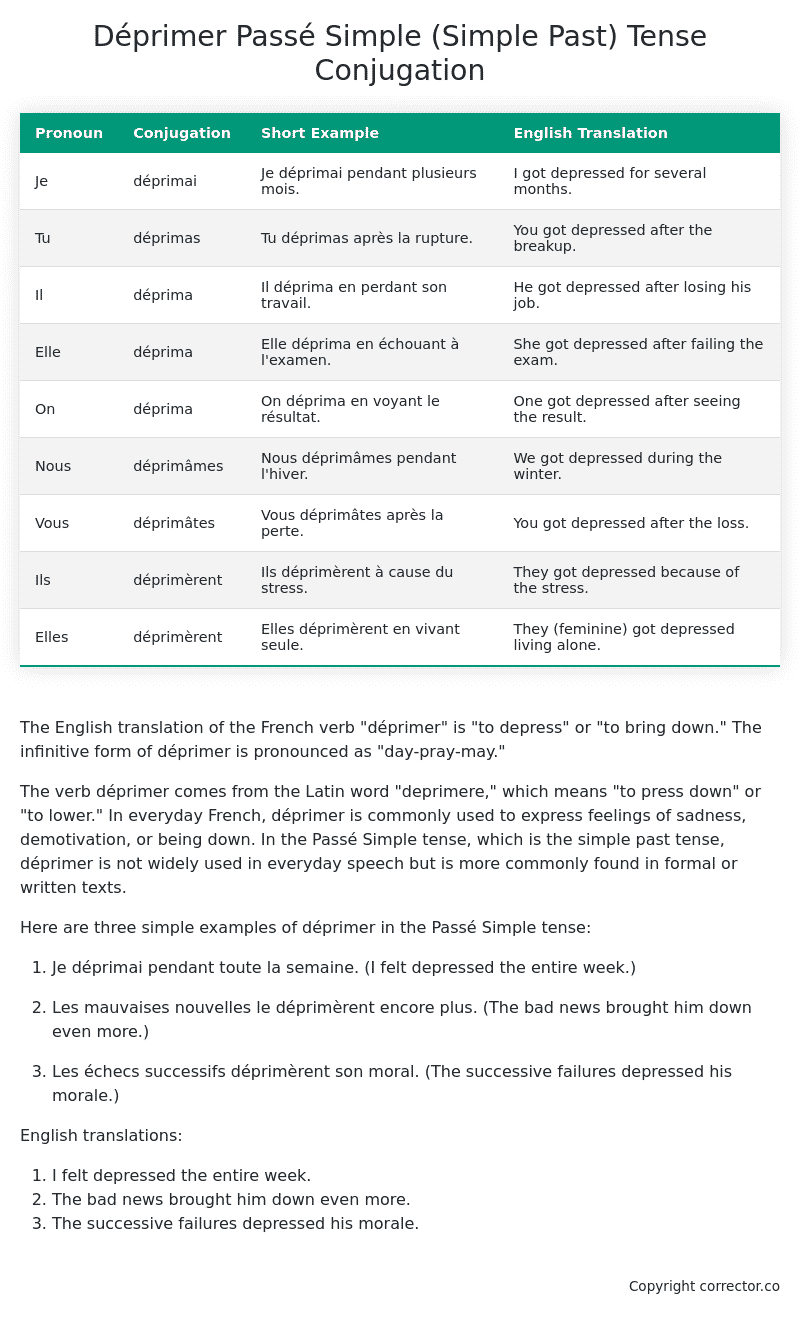Passé Simple (Simple Past) Tense Conjugation of the French Verb déprimer
Introduction to the verb déprimer
The English translation of the French verb “déprimer” is “to depress” or “to bring down.” The infinitive form of déprimer is pronounced as “day-pray-may.”
The verb déprimer comes from the Latin word “deprimere,” which means “to press down” or “to lower.” In everyday French, déprimer is commonly used to express feelings of sadness, demotivation, or being down. In the Passé Simple tense, which is the simple past tense, déprimer is not widely used in everyday speech but is more commonly found in formal or written texts.
Here are three simple examples of déprimer in the Passé Simple tense:
-
Je déprimai pendant toute la semaine.
(I felt depressed the entire week.) -
Les mauvaises nouvelles le déprimèrent encore plus.
(The bad news brought him down even more.) -
Les échecs successifs déprimèrent son moral.
(The successive failures depressed his morale.)
English translations:
- I felt depressed the entire week.
- The bad news brought him down even more.
- The successive failures depressed his morale.
Table of the Passé Simple (Simple Past) Tense Conjugation of déprimer
| Pronoun | Conjugation | Short Example | English Translation |
|---|---|---|---|
| Je | déprimai | Je déprimai pendant plusieurs mois. | I got depressed for several months. |
| Tu | déprimas | Tu déprimas après la rupture. | You got depressed after the breakup. |
| Il | déprima | Il déprima en perdant son travail. | He got depressed after losing his job. |
| Elle | déprima | Elle déprima en échouant à l’examen. | She got depressed after failing the exam. |
| On | déprima | On déprima en voyant le résultat. | One got depressed after seeing the result. |
| Nous | déprimâmes | Nous déprimâmes pendant l’hiver. | We got depressed during the winter. |
| Vous | déprimâtes | Vous déprimâtes après la perte. | You got depressed after the loss. |
| Ils | déprimèrent | Ils déprimèrent à cause du stress. | They got depressed because of the stress. |
| Elles | déprimèrent | Elles déprimèrent en vivant seule. | They (feminine) got depressed living alone. |
Other Conjugations for Déprimer.
Le Present (Present Tense) Conjugation of the French Verb déprimer
Imparfait (Imperfect) Tense Conjugation of the French Verb déprimer
Passé Simple (Simple Past) Tense Conjugation of the French Verb déprimer (You’re reading it right now!)
Passé Composé (Present Perfect) Tense Conjugation of the French Verb déprimer
Futur Simple (Simple Future) Tense Conjugation of the French Verb déprimer
Futur Proche (Near Future) Tense Conjugation of the French Verb déprimer
Plus-que-parfait (Pluperfect) Tense Conjugation of the French Verb déprimer
Passé Antérieur (Past Anterior) Tense Conjugation of the French Verb déprimer
Futur Antérieur (Future Anterior) Tense Conjugation of the French Verb déprimer
Subjonctif Présent (Subjunctive Present) Tense Conjugation of the French Verb déprimer
Subjonctif Passé (Subjunctive Past) Tense Conjugation of the French Verb déprimer
Subjonctif Imparfait (Subjunctive Imperfect) Tense Conjugation of the French Verb déprimer
Subjonctif Plus-que-parfait (Subjunctive Pluperfect) Tense Conjugation of the French Verb déprimer
Conditionnel Présent (Conditional Present) Tense Conjugation of the French Verb déprimer
Conditionnel Passé (Conditional Past) Tense Conjugation of the French Verb déprimer
Conditionnel Passé II (Conditional Past II) Tense Conjugation of the French Verb déprimer
L’impératif Présent (Imperative Present) Tense Conjugation of the French Verb déprimer
L’impératif Passé (Imperative Past) Tense Conjugation of the French Verb déprimer
L’infinitif Présent (Infinitive Present) Tense Conjugation of the French Verb déprimer
L’infinitif Passé (Infinitive Past) Tense Conjugation of the French Verb déprimer
Le Participe Présent (Present Participle) Tense Conjugation of the French Verb déprimer
Le Participe Passé (Past Participle) Tense Conjugation of the French Verb déprimer
Struggling with French verbs or the language in general? Why not use our free French Grammar Checker – no registration required!
Get a FREE Download Study Sheet of this Conjugation 🔥
Simply right click the image below, click “save image” and get your free reference for the déprimer Passé Simple tense conjugation!

Déprimer – About the French Passé Simple (Simple Past) Tense
Formation
Usage
Narration
Historical Context
Interactions with other tenses
Passé Composé
Imparfait
Conditional and Subjunctive
Summary
I hope you enjoyed this article on the verb déprimer. Still in a learning mood? Check out another TOTALLY random French verb conjugation!


